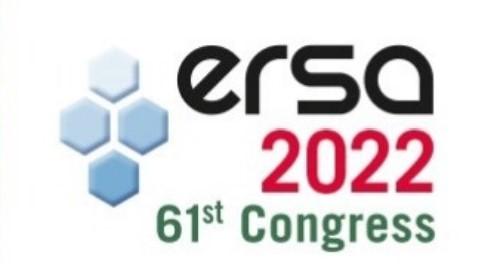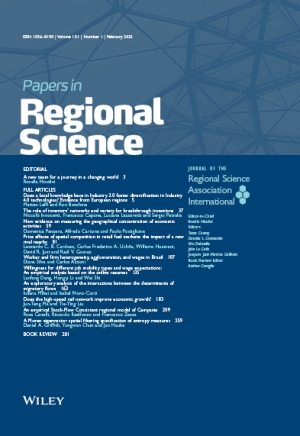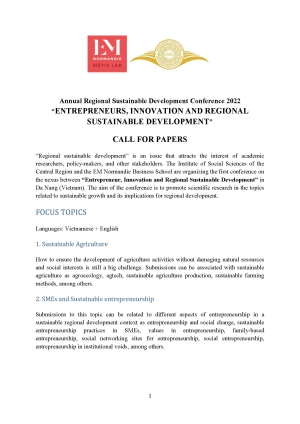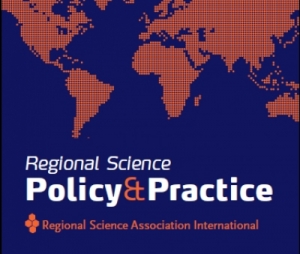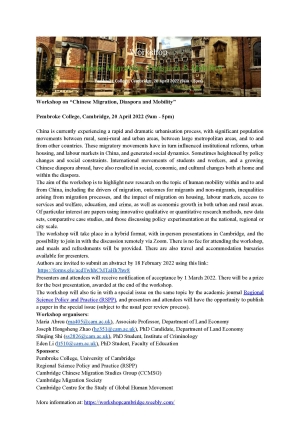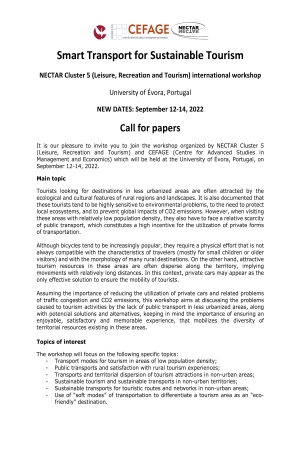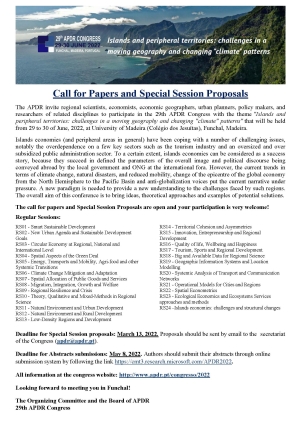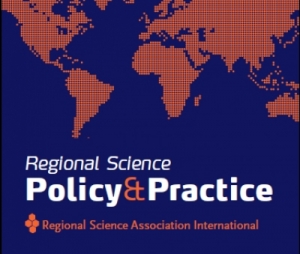RSPP Special Issue Award
Elisabete Martins
Only 7 days left to submit for #ERSA2022 - deadline 28 February 2022
|
|
|
|
|
|
|
|
|
|
|
|
|
|
|
The latest issue of Papers in Regional Science are available! Volume 101, Issue 1, February 2022
EDITORIAL
FULL ARTICLES
Does a local knowledge base in Industry 3.0 foster diversification in Industry 4.0 technologies? Evidence from European regions
Pages: 5-35
First Published:02 November 2021
Pages: 37-57
First Published:01 November 2021
New evidence on measuring the geographical concentration of economic activities
Pages: 59-79
First Published:02 November 2021
Price effects of spatial competition in retail fuel markets: the impact of a new rival nearby
Pages: 81-105
First Published:11 November 2021
Worker and firm heterogeneity, agglomeration, and wages in Brazil
Pages: 107-133
First Published:15 October 2021
Willingness for different job mobility types and wage expectations: An empirical analysis based on the online resumes
Pages: 135-161
First Published:19 August 2021
An exploratory analysis of the interactions between the determinants of migratory flows
Pages: 163-182
First Published:22 October 2021
Does the high-speed rail network improve economic growth?
Pages: 183-208
First Published:27 October 2021
An empirical Stock-Flow Consistent regional model of Campania
Pages: 209-257
First Published:11 November 2021
A Moran eigenvector spatial filtering specification of entropy measures
Pages: 259-279
First Published:28 November 2021
BOOK REVIEW
The economic geography of cross-border migration, Edited by Karima Kourtit, Bruce Newbold, Peter Nijkamp and Mark Partridge, Springer Nature, 2021, 573pp., 4 maps, 50 tables, 73 figures, Index, EUR 139.99, ISBN 978-3-030-48291-6, DOI: 10.1007/978-3-030-48291-6
Pages: 281-282
First Published:24 January 2022
Call for Papers | International conference on Regional Sustainable Development, 21-22July 2022, Danang, Vietnam
International conference on Regional Sustainable Development on 21st and 22nd of July 2022 in Danang (Vietnam), collaborating with the Institute of Social Sciences of the Central Region (ISSCR) and EM Normandie Business School. The main topics of the conference are:
- Sustainable Agriculture
- SMEs and Sustainable Entrepreneurship
- CSR and Sustainable Development
- Sustainable Supply Chain, Logistics, and Transportation
- Sustainable Innovation
Note that a special issue of the Journal of Asia Business Studies is associated with the conference.
For more details, please see the Call for papers attached or visit the conference website: http://aissc.org.vn/index.php/en/
CALL for Special Issue: UKRAINE: GEOPOLITICAL REALITIES AND REGIONAL DEVELOPMENT PERSPECTIVES

Regional Science Policy & Practice (RSPP)
CALL for Special Issue: UKRAINE: GEOPOLITICAL REALITIES AND REGIONAL DEVELOPMENT PERSPECTIVES
Guest editors:
Gabriela Carmen Pascariu, Alexandru Ioan Cuza University of Iasi, Romania; This email address is being protected from spambots. You need JavaScript enabled to view it.
Oksana Holovko-Havrysheva, Ivan Franko National University, Ukraine; This email address is being protected from spambots. You need JavaScript enabled to view it.
Oksana Krayevska, Ivan Franko National University, Ukraine; This email address is being protected from spambots. You need JavaScript enabled to view it.
SUBMISSION GUIDELINES:
- The deadline for paper submission is December 31, 2023; however, early submissions are welcome and encouraged.
- The contributors are required to follow the authors’ guidelines, available at: https://rsaiconnect.onlinelibrary.wiley.com/hub/journal/17577802/homepage/forauthors.
Ukraine became independent in 1991 after the dissolution of the Soviet Union. Like any country in the post-Soviet area it started to develop its own foreign policy, to conduct structural reforms to foster its economic development and it transformed to the key actor for ensuring internationally security, stability and prosperity. After the Euromaidan (2013) and the Revolution of Dignity (2013-2014), Ukrainian society clearly defined the main directions of its foreign policy leading to the incorporation of the European aspirations in the Constitution of Ukraine in 2019. However, independence of Ukraine became challenged by internal difficulties in reforming its political, economic and legal systems and external threats.
By addressing the internal developments in the country and external policies towards it by other international actors from an inter/multi/transdisciplinary perspective, this special issue addresses the new political, economic and societal transformations in Ukraine aimed at increasing stability, security and sustainable development inside the country, on the European continent and worldwide. Ukraine is trying to overcome different challenges caused by the geopolitical situation, geographical position and economic development, which cause many difficulties for achieving positive outcomes in economic and societal transformation processes internally and externally, especially in the cooperation with neighbouring countries. However, these challenges create new opportunity windows for deep and comprehensive internal transformations leading to the modernisation of all spheres of socio-economic and political life. These new opportunities cover such areas, but are not limited to good governance, strengthening democracy and capacities of political institutions, supporting regional development, ensuring resilience while reaching the sustainable development goals.
It aims, therefore, to bring together papers on theoretical and empirical research results on Ukraine from the multidisciplinary perspectives of economy, governance, institutions, culture/identity/history, international relations, European integration, human security, political science, society and democracy, or environmental issues and how to connect them with the sustainable development and regional development.
Below are some examples of topics relevant for the special issue on Ukraine: geopolitical realities and regional development perspectives:
- Historical Analysis of Evolving Political Geographies and Geoeconomics;
- Actors, Institutions and Commitments: General Characteristics of the International Cooperation Practices of Ukraine;
- War/Conflict in the East of Ukraine: Looking for Multidisciplinary Solutions and Overcoming Challenges;
- Content Analysis of Media on the Conflict in the East of Ukraine and the Annexation of Crimea;
- Economic Development and Striving for Competitive Advantages on Global and Regional Markets;
- Going Digital: Ukrainian Perspectives on Digitalization of Public and Private Life;
- Ukrainian migration: economic, social and legal perspectives;
- Social Development and Spatial Integration in Ukraine;
- Regional Development in Ukraine: Internal and External Dimensions;
- Ukraine in the Baltic-Black Sea Region;
- Walls or Links of European Design;
- Russian Policies towards Ukraine;
- Ensuring Security, Stability and Resilience: Ukrainian and Global Perspectives;
- Tackling Environmental Issues: EU Green Deal and Combating Environmental Degradation;
- Transformation of Public Governance in Ukraine: Lost between European Perspectives and Soviet Legacy;
- Improving Energy Security in Ukraine for Boosting Economic Development and Stability;
- Ensuring Rule of Law in Ukraine: Trends, Achievements and Difficulties;
- EU and Ukraine: Challenge to Integrate;
- Boosting Innovations in Ukraine: The Role of Education, Research and Development policies;
- Overcoming COVID-19 in Ukraine: Reforming Public Health Sector.
By this special issue, we intend to contribute to a better understanding of geopolitical realities and regional development perspectives of Ukraine, focussing on processes, activities, linkages with the various actors and policies with high relevance for evidence-based policymaking.
NOTICE:
All submissions will undergo the double blind peer review process that is generally applied for the journal. To submit a manuscript, you will register and submit your paper online at: https://mc.manuscriptcentral.com/rspp. When making your submission, you have to indicate at the cover letter that is for the Special Issue entitled “Ukraine: geopolitical realities and regional development perspectives”.
SELECTED REFERENCES:
Workshop on “Chinese Migration, Diaspora and Mobility”, Pembroke College, Cambridge, 20 April 2022
Workshop on “Chinese Migration, Diaspora and Mobility”
Pembroke College, Cambridge, 20 April 2022 (9am - 5pm)
China is currently experiencing a rapid and dramatic urbanisation process, with significant population movements between rural, semi-rural and urban areas, between large metropolitan areas, and to and from other countries. These migratory movements have in turn influenced institutional reforms, urban housing, and labour markets in China, and generated social dynamics. Sometimes heightened by policy changes and social constraints. International movements of students and workers, and a growing Chinese diaspora abroad, have also resulted in social, economic, and cultural changes both at home and within the diaspora.
The aim of the workshop is to highlight new research on the topic of human mobility within and to and from China, including the drivers of migration, outcomes for migrants and non-migrants, inequalities arising from migration processes, and the impact of migration on housing, labour markets, access to services and welfare, education, and crime, as well as economic growth in both urban and rural areas. Of particular interest are papers using innovative qualitative or quantitative research methods, new data sets, comparative case studies, and those discussing policy experimentation at the national, regional or city scale.
The workshop will take place in a hybrid format, with in-person presentations in Cambridge, and the possibility to join in with the discussion remotely via Zoom. There is no fee for attending the workshop, and meals and refreshments will be provided. There are also travel and accommodation bursaries available for presenters.
Authors are invited to submit an abstract by 18 February 2022 using this link: https://forms.gle/acdTwhhCMTaHh7hw8
Presenters and attendees will receive notification of acceptance by 1 March 2022. There will be a prize for the best presentation, awarded at the end of the workshop.
The workshop will also tie in with a special issue on the same topic by the academic journal Regional Science Policy and Practice (RSPP), and presenters and attendees will have the opportunity to publish a paper in the special issue (subject to the usual peer review process).
Workshop organisers:
Sponsors:
More information at: https://workshopcambridge.weebly.com/
Call For Applications | THE BENJAMIN H. STEVENS 2022–2023 GRADUATE FELLOWSHIP IN REGIONAL SCIENCE
Graduate students enrolled in Ph.D. programs in North America are encouraged to apply for the Twenty-First Benjamin H. Stevens Graduate Fellowship in Regional Science, administered by the North American Regional Science Council of the Regional Science Association International (NARSC-RSAI).
https://www.narsc.org/newsite/awards-prizes/stevens-graduate-fellowship/applications/
NECTAR Cluster 5 (Leisure, Recreation and Tourism) international workshop
Dear NECTAR colleagues,
Due to the travel restrictions and general uncertainty related to covid-19, the organizers of the workshop "Smart Transport for Sustainable Tourism" have decided to postpone it to September 12-14 (Évora, Portugal).
See the new call attached.
Best regards
--
Ana Condeço-Melhorado
NECTAR Secretary

Call for Papers and Special Session Proposals | 29th APDR Congress | 29-30 June 2022, University of Madeira, Funchal, Madeira, Portugal
Call for Papers and Special Session Proposals
The APDR invite regional scientists, economists, economic geographers, urban planners, policy makers, and researchers of related disciplines to participate in the 29th APDR Congress with the theme "Islands and peripheral territories: challenges in a moving geography and changing "climate" patterns" that will be held from 29 to 30 of June, 2022, at University of Madeira (Colégio dos Jesuítas), Funchal, Madeira.
Islands economies (and peripheral areas in general) have been coping with a number of challenging issues, notably the overdependence on a few key sectors such as the tourism industry and an oversized and over subsidized public administration sector. To a certain extent, islands economies can be considered as a success story, because they succeed in defined the parameters of the overall image and political discourse being conveyed abroad by the local government and ONG at the international fora. However, the current trends in terms of climate change, natural disasters, and reduced mobility, change of the epicentre of the global economy from the North Hemisphere to the Pacific Basin and anti-globalization voices put the current narrative under pressure. A new paradigm is needed to provide a new understanding to the challenges faced by such regions. The overall aim of this conference is to bring ideas, theoretical approaches and examples of potential solutions.
The call for papers and Special Session Proposals are open and your participation is very welcome!
Regular Sessions:
Deadline for Special Session proposals: March 13, 2022. Proposals should be sent by email to the secretariat of the Congress (This email address is being protected from spambots. You need JavaScript enabled to view it.).
Deadline for Abstracts submissions: May 8, 2022. Authors should submit their abstracts through online submission system by following the link https://cmt3.research.microsoft.com/APDR2022.
All information at the congress website: http://www.apdr.pt/congresso/2022
Looking forward to meeting you in Funchal!
The Organizing Committee and the Board of APDR 29th APDR Congress
RSPP Call for Papers | Special Issue on Pathbreaking trajectories: Socio-economic and Institutional de-peripheralization of marginal areas
Regional Science Policy & Practice (RSPP)
Call for papers for RSPP Special Issue on Pathbreaking trajectories: Socio-economic and Institutional de-peripheralization of marginal areas
In recent decades, economic and political inequalities between different macro-areas of the world have increased. Moreover, spatial inequalities within macro-areas have also grown. In this scenario, the relations between economy-politics-society at the local level have become more kaleidoscopic and entropic than in the second half of 20th Century.
Against this background, new scholarly and policy attention has been devoted to peripheral, marginal, or ‘left-behind’ areas, i.e., those territories in which the economy is struggling, institutions are producing vicious lock-in type cycles, social elites are strengthening themselves through extractive and appropriative orientations towards public goods, and de-anthropization and depopulation are growing. At the same time, it becomes urgent to investigate further the reverse processes, i.e., under what circumstances peripheral areas can extract themselves – at least partly – from their marginality.
The time is, indeed, ripe to solicit a comprehensive and in-depth international examination of a counterintuitive and unexpected puzzle: what are the economic, social and institutional mechanisms that make it possible for peripheral areas to regain centrality and vitality unexpectedly, even in a short time span?
This special issue aims to collect contributions concerning these unexpected phenomena of pathbreaking trajectories that is the economic and institutional de-peripheralization of marginal areas. To this end, we intend to bring together scientific contributions from interconnected research fields mainly related to geography, sociology, political science and public policy, political economy, and anthropology – shedding new light on the processes that the de-peripheralization of marginal areas rely upon. This reasoning is based on a general assumption according to which simple geographic features do not determine per se socio-spatial divisions and peripheralization. Peripheral areas are not natural; they emerge as a result of (not neutral) processes that imply hierarchical and power relationships. This has been emerging in a contradictory scenario. The world is increasingly global, but balkanized nonetheless; suffice it to say that new fractures between Northern and Southern Europe have occurred, intersecting with those between East and West Europe; North America-Central America; Rural and urban China, etc.
In other words, peripheral spaces are produced; they can be the outcomes of more or less intentional construction processes pertaining to institutional and political assets, relational patterns and social norms, and the unequal allocation of economic resources. It therefore becomes essential to observe how and if multidimensional socio-economic changes may occur within peripheral areas deconstructing their marginality. In the literature, the attempt of demarginalization of peripheral areas have been often analyzed with respect to top-down initiatives; that is initiatives coming from political center(s) and directed towards peripheries (i.e., development aid programs, exogenous investments, national and international cooperation to support disadvantaged places, etc.). By contrast, this Special Issue intends to systematize and promote those studies that assume an internal point of view to peripheral areas, focusing on autonomous dynamics that are mainly endogenous to those contexts.
Strictly speaking, we invite papers including, but not limited to, contributions on the following aspects:
- Institutional changes making a given area or region less marginal. These dynamics occur through the displacement of institutional assets or their more or less intentional adaptation/conversion to some shifts of the socio-economic Therefore, we are soliciting papers that analyze the mechanisms leading to the formation in peripheral areas of political economy structures overcoming previous consolidated weaknesses so that the institutional assets become more robust.
- Collective actions and 'self-governance' processes at the local level. Here we refer to papers investigating the determinants of the emergence in peripheral areas of “social molecules or groups” enhancing the governing of common and public goods that can help to enlarge social well-being and reduce economic In this respect, investigations are relevant about different types of government and production of ‘common goods’ emerging from below that assert themselves as local resistance entities against hegemonic forms of
- Changes in the relational networks of elite groups. It can be said that how elites are interconnected internally and tied to economic and political spheres vary in different In this respect, marginal areas are often characterized by: i) restricted and mutually disconnected elite circles, with a predatory orientation, thus subjugating the economic and political spheres; ii) elite networks that can penetrate politics and economics circles, so to establish mutual dependence and patronage patterns of resource Hence, it is relevant to consider investigations reconstructing the dynamics through which relational patterns of the elites that are less hostile towards the general interest can be established. More precisely, we refer to papers investigating how and if elite networks marked by “embedded autonomy” – which favor a developmental orientation from the State, links between economy-politics-society in the light of mutual independence – occur.
- Economic renewal and innovation. A way through which peripheral areas redeem themselves concerns the economic renewal of abandoned industrial sectors and spaces, the new emergence of craftsmanship sectors, and other types of economic Reorientations that result in lasting development processes are rare and difficult to To understand success cases in the light of examples of failure, there needs to be empirical investigations on how the strategies of political economies support the formation of new relational patterns between the actors of innovation and the different institutions at the spatial level. Also, evidence is needed on where and how spontaneous dynamics of economic renewal or industrial reconversion or revitalization emerge. Hence, the demarginalization processes of peripheries re-orienting their development path is a way to observe the social and political/institutional re-embedding of economic activities.
We invite papers from a range of perspectives, different disciplines, and from around the world. Contributions combining empirical investigations well framed in clear conceptual frameworks are well- suited for the Special Issue. Comparative papers suggesting some policy orientations will be also highly appreciated.
Authors are invited to submit an abstract by the 15th of April 2022 to Luca Storti (This email address is being protected from spambots. You need JavaScript enabled to view it.), Giulia Urso (This email address is being protected from spambots. You need JavaScript enabled to view it.) and Neil Reid (This email address is being protected from spambots. You need JavaScript enabled to view it.). Abstracts should be between 250 and 500 words in length. We will inform everyone on or around May 1, 2022, as to whether their abstract has been accepted for the special issue. Full papers are expected by 1st December 2022, and publication expected in fall 2023, following the peer review process.
Submission of complete papers
to: https://rsaiconnect.onlinelibrary.wiley.com/journal/17577802, at the submission add in the cover letter that is for the Special Issue on: Pathbreaking trajectories: Socio-economic and Institutional de-peripheralization of marginal areas
Call for Papers | 2022 SRSA Annual Meeting in Austin, TX
Join us for the 61st Annual Meeting of the Southern Regional Science Association at the Sheraton Austin Hotel at the Capitol April 7-9, 2022
Submit Individual Abstracts and Organized Sessions by February 1st at www.srsa.org
Upcoming Deadlines
Early Bird Registration Discount: February 1st
Moriarty Graduate Student Paper Award: February 15th
William H. Miernyk Research Excellence Medal: February 24th
Additional information can be found at 2022 SRSA Conference Website
About Us
The Regional Science Association International (RSAI), founded in 1954, is an international community of scholars interested in the regional impacts of national or global processes of economic and social change.



